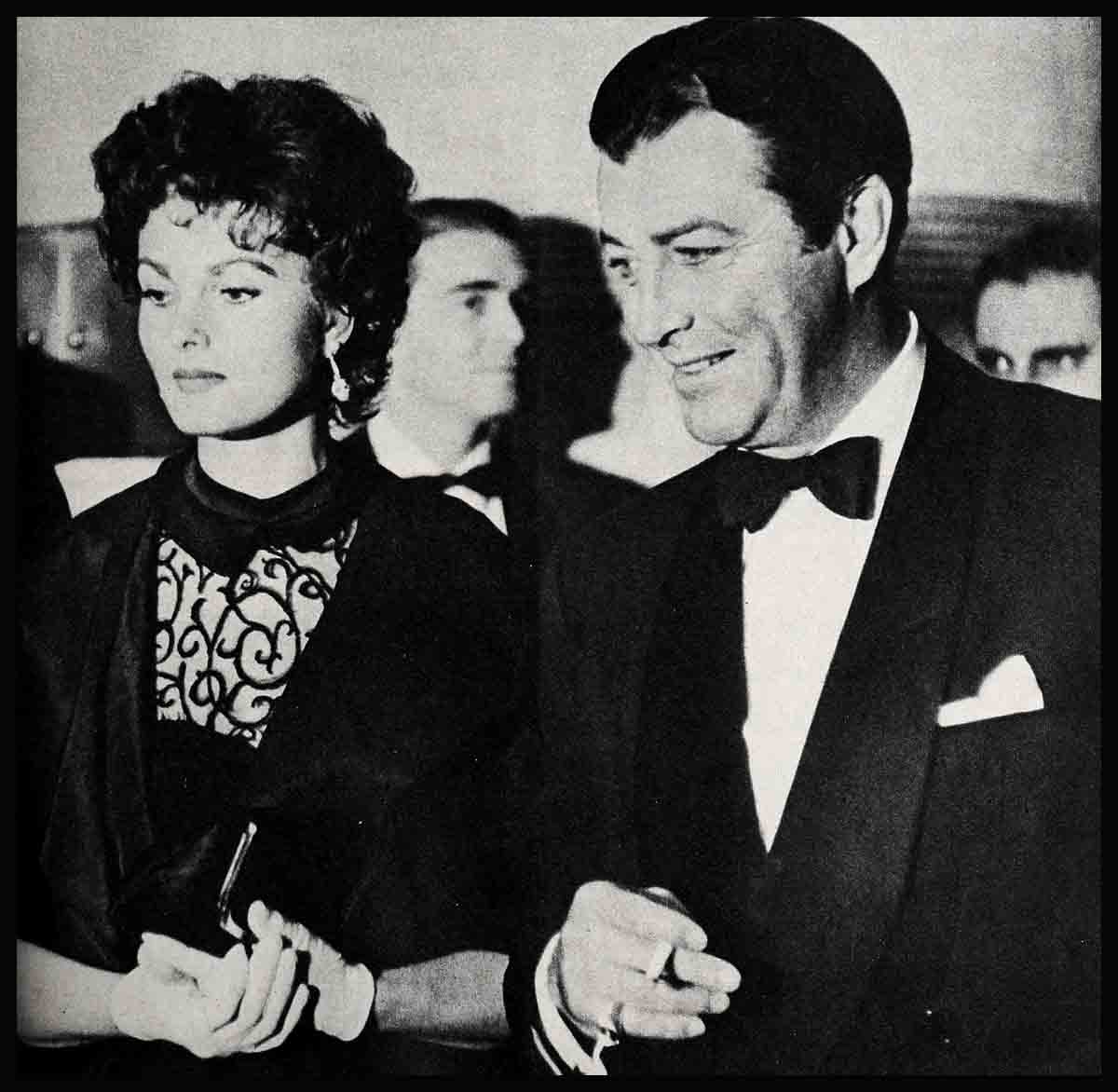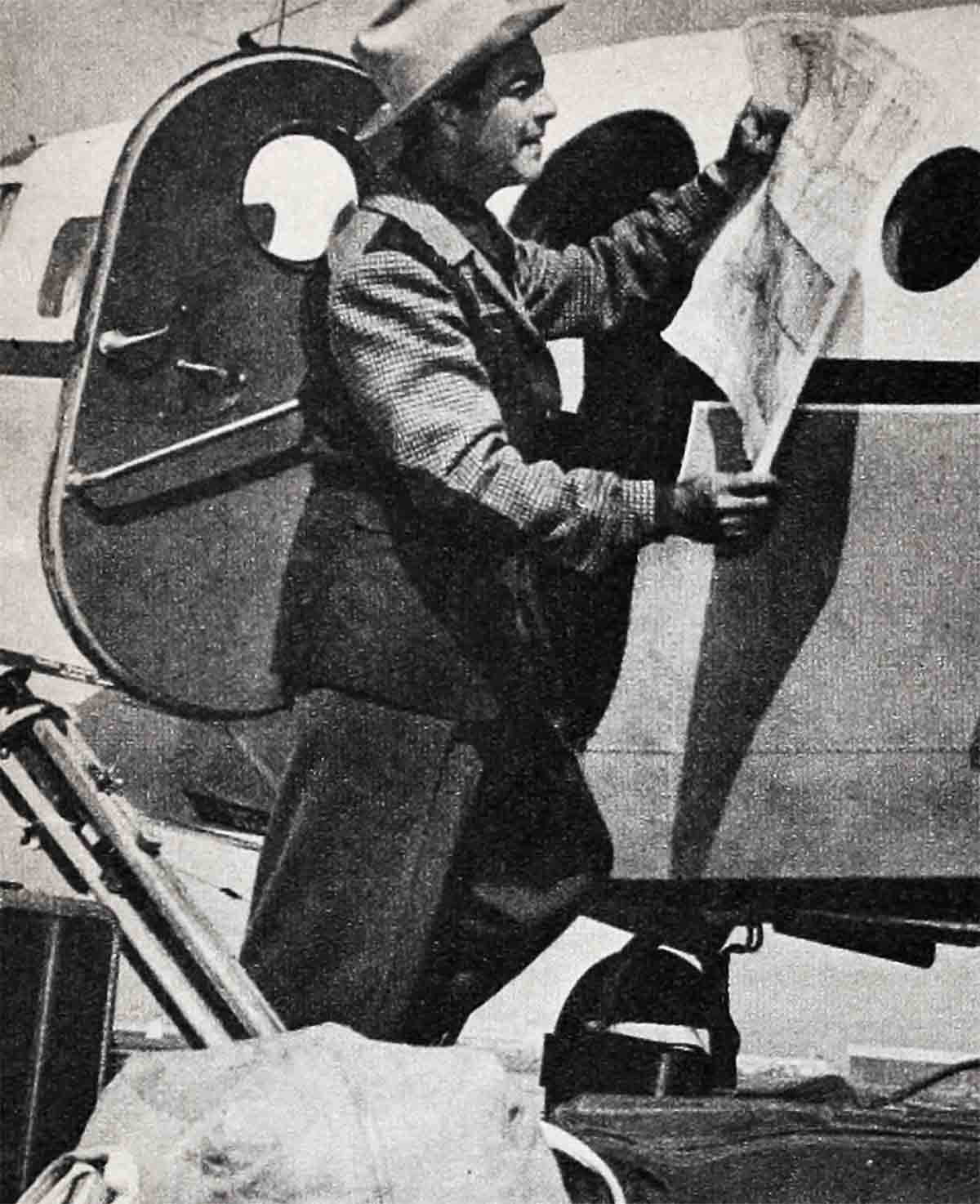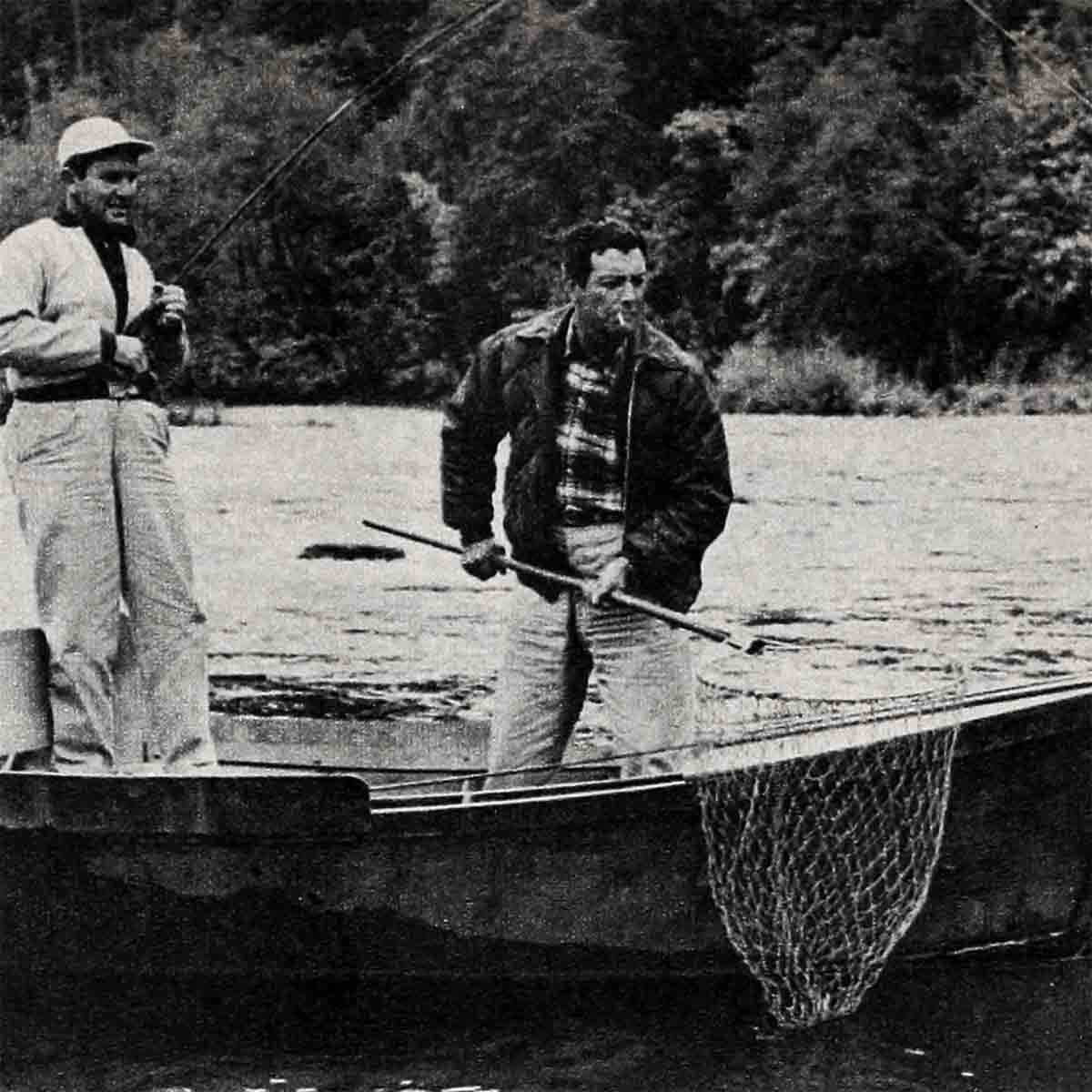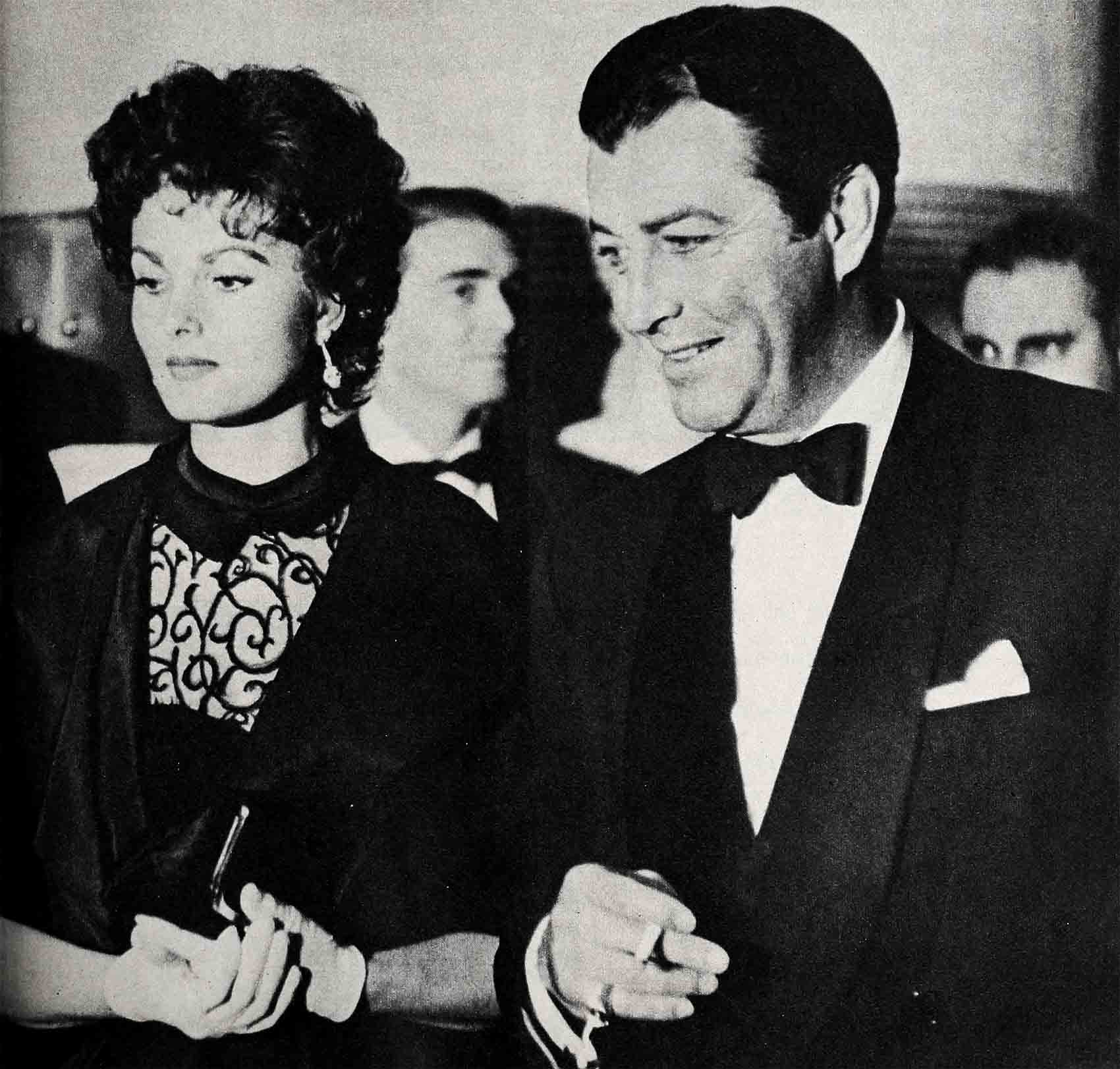
Their Date With Destiny—Robert Taylor & Ursula Thiess
The father-to-be is literally walking on clouds,” said Ursula Thiess Taylor. Then she smiled, in a way you almost never see a Hollywood girl smile, her dark green eyes touched with a gentle, adoring humor, warming as an open fire on a cold, rainy night.
As a matter of fact, her smile was welcome on the lowering winter afternoon when we were talking. We were sitting in the little house which Ursula had rented almost two years ago when she learned it was the type of small modern house that Bob Taylor preferred.
Now, like the solid embodiment of romance come true, only a few blocks away a rambling, very modern farmhouse was going up, the home of the new Mr. and Mrs. Robert Taylor.
The color came up into her cheeks. “Isn’t it a lovely place?” she asked.
I agreed it was. I could not help remembering a year back when Ursula found her first. little house. Not many people in Hollywood knew her then, this tall, incredibly beautiful, delicately reserved girl. But I was lucky enough to have met her, being a friend of her closest friends, the Ernest Hallers.
She was aglow with love even then. Not that she mentioned it. She is never much given to talk, anyway, though she is a prodigious reader, a lover of music, a gourmet. But anyone who has ever known devotion would have known at a glance that she was in love.

When she rented the little house on her tiny RKO salary, it meant she had to give up many other expenditures to afford it. Not that she even gave a second thought to the sacrifice of clothes, a car or personal luxuries in favor of the little house. And she has long since dismissed the memory of them from her mind, now that she is Mrs. Robert Taylor and next June, if all goes as perfectly as she and Bob have every right to expect, she will be the mother of his first child.
“Which do you want, a boy or a girl?” I asked her.
“Bob thinks he wants a daughter more,” she said.
“But what about you?”
“I want whatever Bob wants,” she replied.
This is utterly true. Take Bob’s hunting, for instance. Bob’s a man who truly dotes on getting up at four-thirty on a fall morning, wading out to a duck blind, sitting there for hours, and then shooting away like crazy. Expertly, too.
Barbara Stanwyck, Bob’s first wife, loathed outdoor sports. Hunting was not for her or flying either. She didn’t mind Bob taking his private plane up into the wild blue yonder, but she stayed in Beverly Hills.
I asked Ursula about these sports. She loves flying. She’s learning to hunt.
“Imagine me, shooting those little animals,” she said.
“But how do you really feel about it?” I persisted.

“Cold,” said Ursula, laughing. “It is so cold before the sun rises, and it’s wet, and the guns are big and hard to manage. But I shall love it when I learn it well.”
She will, too. She’ll learn it and she’ll love it. This is the girl who learned to speak fluent English after a mere four-months study. As for love, from the night of their “first blind date,” except for one very brief period, trying to make Bob Taylor happy has been the most important thing in her own life.
There have been many different stories about how Bob and Ursula met. But it was through the careful arrangement of their mutual agent, Harry Freedman, that they first became acquainted. It was the evening that the Andrews Sisters were opening at the Cocoanut Grove. Freedman invited Bob Taylor. “I’ll come, but you’ll have to get me a date,” said Bob.
Freedman then called Ursula. Being Ursula, she merely said, in her deep, only slightly accented voice, “Thank you very much.”
She didn’t know whether or not Robert Taylor was a wolf, but she had good reason to be wary of wolves. Young, exquisitely beautiful, a divorcee, a low-salaried starlet at a major studio, a European, she was all that a Hollywood wolf could ask for. And that they had gone for her is no secret. That they had failed was no secret either. False love Ursula didn’t want—nor a false career either.
Personally I think Ursula’s wisdom was due almost as much to the hardships of her war years as to her own inner strength of character. For most beautiful girls life is too easy. But Ursula grew up in wartime Germany. Both her children were born during those terrible bombardments that literally pounded her native city of Hamburg to bits.
She rarely mentions these war days, just as she never mentions her first marriage. Yet an occasional reference to her work with a forced farm labor gang will slip out, just as when she first came to Hollywood, she couldn’t keep from talking about her children when she was with friends.

This habit of talking about her children ran counter to her studio’s plans. Their idea had been to make a devastating siren of her. Ursula wasn’t supposed to mention Manuela, her slim lovely daughter, who is now ten, or Michael, her son, who is eight. Yet she missed them so desperately it was all she could do to keep them out of her conversation. They were, in fact, the chief reason she had flown to America after her photograph had appeared in Life and RKO had offered her a contract. She was a top German model then, but she knew that any movie contract would let her earn money that would support them all in greater comfort.
Thus, when the Freedmans picked her up for the opening night of the Andrews Sisters, she didn’t know what she might be about to encounter. But when Bob Taylor put out his hand to shake hers, she started back in superstitious awe.
His gold cuff links, she saw, were made in the zodiac sign of Leo.
With her natural poise and reserve, she didn’t tell Bob what had so startled her about that, and as far as I know, she’s never told this story before.
You see, when Ursula was twelve and the very proper daughter of a prosperous Hamburg businessman, she had her fortune read. It was only for fun, of course, and she didn’t take it seriously, but she remembered every word of it.
“Someday you will go far across the sea,” the fortuneteller said. “You will meet one of the handsomest men you have ever seen. He will also be rich and famous. He is to be your true love; you will know at your first meeting for he will Me wearing the mark of Leo plainly upon him.”

It was a fantastic dream and twelve-year-old Ursula knew it. Later, when war broke out, all dreams and all realities, like her father’s wealth, their home, her schooling, even her young, impetuous marriage were lost in the holocaust.
But the fortuneteller’s prophecy came back to her as Robert Taylor’s hand touched hers. For here she was six thousand miles across the sea from her native Germany. Here was one of the handsomest men on earth smiling down upon her, a famous man, a rich man. And she was falling wildly in love with him at that second, having no idea of the fantastic odds she would be up against in capturing him.
Yet being the kind of girl she is, Ursula Thiess’ second thought that evening was purely emotional. “How lonely this man is,” she thought. “How terribly lonely.” And in that instant she lost her own loneliness in the maternal tenderness she felt for this tall, handsome stranger.
The next day Bob called her. “I wonder if you’d be free for dinner with me tomorrow night?”
Ursula was free. She was free two nights later, also, and the two nights after, and two after that. And then the next night, and the next and the next.
Thus it began. And thus, presently, began something else—the campaign of Barbara Stanwyck’s many loyal friends to effect a reconciliation between her and Bob.
The campaign was as completely well-meant as the current campaign to get Nancy and Frank Sinatra back together. But the situation was entirely different. Bob had been divorced for a considerable time before he even met Ursula, and his marriage with Barbara had been shaky long before he actually asked for his freedom.
But because he was the one who wanted the divorce, he wanted to remain friends with Barbara. At the time of their final parting, there was no other man and no other woman in their lives. Their separation was due to plain incompatability—the drawing away of interests from one another.
Barbara’s work is virtually her whole life. Bob loves his work, too, but he has scores of other interests. He gets high pleasure from hunting, fishing, flying, traveling, and all the outdoor-man activities. He wakes with the sun and wouldn’t mind a bit if he went to bed by it. Barbara is a night owl, the complete city girl—as tailored in her thoughts and reactions as she is tailored in the clothes she wears.
With most of his films being made on location, Bob had temporarily moved in with his mother when he became free. Before he met Ursula, he dated only rarely and Ursula had been correct in discerning at their first meeting that he was lonely.
He did the correct thing the evening of his second date with Ursula. They did the night club circuit. The next time, they did the smart restaurant circuit. The third time Ursula suggested that she prepare the dinner.
Now why on earth Bob Taylor should be a somewhat shy man is one of those puzzles best left to the Freud department. He’s been a success from his very first entrance into Hollywood. And even at the start of his career, he was revealed not only as an extraordinarily handsome personality but a superb actor when he appeared opposite Garbo in “Camille.”
Today he earns better than $5,000 a week, but he’s always kept out of the main Hollywood swing of things. And after he left Barbara, he shied away more than ever.
If Bob was in for a surprise in discovering that a beauty like Ursula was a whiz around the kitchen, she was in for exactly the same surprise where he was concerned. For him she made those incredibly huge German potato pancakes. To this day he can never get his fill of them. For her he grilled steaks in a way she’d never encountered before.
Recently while Ursula had been completing “The Americano” for RKO, Bob had one of those rare intervals when he wasn’t working. So every evening, when she got back from the studio, Bob would have dinner waiting for her, prepared by Bob, too. “One night we had a dish that I know takes five hours to prepare,” Ursula told me proudly. “But there it was.”
Back in their dating days, before Bob realized it was actually a courtship, he found it increasingly more pleasant to dine at Ursula’s. She didn’t at all mind if he preferred to eat at such an unfashionable hour as six. Later they’d merely talk or play records. And, if he went back to his mother’s as early as nine, she understood that, too.
This was happiness. And then he discovered, date by date, it was even a greater happiness to share the sports he’d always loved with Ursula.
Of course, he did have to go away on location trips. He went to England to make “Knights of the Round Table.” He went on location to make “Rogue Cop.” Occasionally he took Barbara out to dinner. And every time he did, the columnists made a big thing of it.
You couldn’t blame the columnists. It was terrific copy, Bob Taylor dating his ex-wife, and would they or wouldn’t they reunite?
Bob wrote Ursula long letters from England almost every day, and from “The Rogue Cop” location, too. She wrote back, equally long, true love letters. She had long since moved into the little house, but it was a black day for her when she discovered herself so entangled with immigration red tape that she could neither go back to Germany to bring her children over, as she had been led to believe she could do, nor could immediately bring them here to join her.
It was an even blacker day for her the evening when Bob was due to go to Egypt to make “Valley of the Kings” for M-G-M. You see, that day Bob had happened upon Barbara at a cocktail party given by the Hollywood Women’s Press Club. Every photographer in town was there and everyone of them photographed the two together.
Thus later, when he came to tell Ursula goodbye, she who had never wanted any love that wasn’t true, told him it was truly goodbye.
So pressed was he for time that Bob didn’t even have the chance to argue with her. But he wrote the moment he reached England. And wrote. And wrote.
Ursula didn’t reply. Neither did she do the flashy thing of being seen all over town with a score of new escorts. A few times she went out with George Nader, whom she had known since she made her first picture, U.A.’s “Monsoon.” More often she stayed home alone, reading, or went out for quiet dinners with married friends. “I prefer being with happily married people,” she always says. “Some of their happiness reaches you and makes you happy, too.”
The day that Bob returned to Hollywood he phoned her. But, alas, she was busy that night. But, no, not the night after that. Would he come for dinner?
He would indeed, and he did. Only he discovered, on arrival, that Ursula was having dinner for four—he and she and one of her happily married couples. The couple stayed and stayed. And Bob stayed. The couple finally left at 11:30 and maybe it is a good thing they lived in the immediate neighborhood because it was little more than ten minutes later when Ursula was on the phone. “I am wearing the most beautiful engagement ring you ever saw,” she was saying, and she was half-crying and half-laughing in joy.
It really is the most beautiful engagement ring you ever saw, a great pile of diamond baguettes. And her wedding ring is designed so that it fits just under the bottom of the engagement ring, and completes its design.
“I think I never knew quite so well what a fine, thoughtful man Bob is,” Ursula says, “as on our wedding day, last May twenty-fourth. We flew to Jackson Hole, Wyoming, because they knew Bob there from his many hunting trips. And they promised to keep the secret of our securing our license and planning the ceremony there.
“It is, of course, most beautiful country. But Bob especially wanted to go there because we could be alone. There is a vast quiet lake. Bob had arranged for us to go out on it, in a little schooner, just us, our witnesses and the justice of the peace. Perhaps there are other men who would think of all those romantic details that so charm us women, but in my experience I have never known one before. I was so happy. And Bob kept laughing at me on the flight up because I kept rehearsing and rehearsing my responses in the wedding ceremony. I had to get every word perfect so that my husband would understand me.”
“Even the word ‘obey’?” I asked.
“Oh, yes, that one especially,” said Ursula with a laugh. “And now we have the baby to prepare for and our new home. And my daughter, Manuela is here with us. Bob is such a good father to her already. And all the details are untangling, so that soon I shall be able to have my son here, too.”
She stopped and looked down at the beautifully simple sweater and skirt she was wearing. “Bob bought these,” she said. “He goes in shops and picks out several models for me and then tells me to go and choose among them. But I always like best what he likes best. And he’s buying most of the furnishings for our house, too. He has such flawless taste. And on the twenty-fourth of each month, our wedding date anniversary, he always sends me some present.” She paused. “Oh, I am so fortunate,” she said.
I agreed that she was. But I’m sure you will agree that Bob Taylor is, too.
THE END
It is a quote. PHOTOPLAY MAGAZINE APRIL 1955




